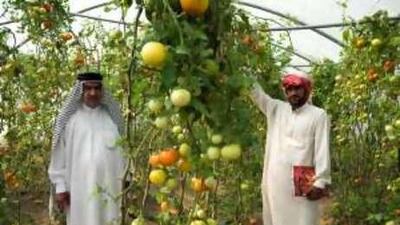AZIZIYAH, IRAQ // On the eastern edge of the Euphrates River flood plain, some 60km south of Baghdad, Karim Hilal and his sons are, for the first time in years, successfully working their farmland. Up until late 2009 the fields were left fallow, with the Hilal family put-off investing by Iraq's perpetual insecurity and the difficulties of getting a bank loan.
Even when they starting planting again, erecting small, low lying propagation tents, they had only managed to turn a small profit, scarcely enough to justify the backbreaking work. That situation changed dramatically in the spring however, after the government banned the import of cheap tomatoes, cucumbers, onions and eggplants from neighbouring Syria and Iran. "The ban on imports changed everything, it has been a huge help, it will support us this year and enable us to actually improve the land," said Mr Hilal. "Before we were lucky to cover our costs and without investment your land is going to get steadily worse not better."
Before the trade restrictions, farmers got as little as US$2 for a 30kg bag of tomatoes, a loss making price resulting from heavy subsidies in Syria and Iran, and Iraq's own food rationing system. The low prices were good for struggling Iraqi consumers, but was disastrous for the nation's agriculture sector, which effectively collapsed. The ministry of agriculture in Baghdad - widely considered corrupt by Iraqis and US reconstruction teams - had done little to alleviate the situation. Theoretically offering loans and expert advice on modern farming techniques, most farmers found it impossible to borrow money unless they paid extortionate bribes to officials. The so-called expert advice was years out of date.
An anti-corruption drive, initiated by the prime minister Nouri al Maliki has, according to observers, now begun to take effect in the ministry, freeing up money and resulting in better administered assistance programmes. Mr Hilal is one of those to have benefited and, encouraged by the higher prices for produce, was able to borrow enough money to fund the purchase and construction of one large green house. That proved so successful in the first season of cultivation that he went back to the government and borrowed enough cash to pay for five more.
At the same time, he decided to invest his own savings in an efficient sprinkler irrigation system, one that uses far less water than the old flood techniques used for generations. That new set-up proved critical ahead of harvest time with a rain shortage continuing to bite. The combination of rising prices for produce and the availability of soft loans appears to have kick-started an agricultural recovery. Farming is suddenly good business in Iraq.
"The irrigation system will be a sensible investment, it will keep the land fertile, reduce water use and save on fertilisers," said Mr Hilal's eldest son Saleem. "We expect it to pay for itself in a year or so. "The green houses will also pay for themselves and we've got five years to pay back the [government's] agriculture bank. To be honest, if we could get a larger loan and put up more green houses we probably would, but we've borrowed to our limit."
An official at the ministry of agriculture, who spoke on condition of anonymity because he was not authorised to speak to journalists, said the impact of the import ban had been dramatic. "We knew it would take something like this to change the situation, so we are glad it has finally happened," he said. Farmers remain concerned however that Iraq's unstable government may change its mind again and permit the resumption of imports. The ministry official refused to rule out such a policy shift, although he said the entire department would be against it.
"The prices we are getting [for produce] now have revolutionised the conditions for farmers," said Karim Hilal. "Although I would say the revolution is still fragile. If the government withdraws the protection, things would collapse very quickly, we'd be back in the same situation we used to be in. "I hope they [the authorities] realise that the steps they've taken have helped to stop the decay of Iraqi farming, but that we need it to be sustained if the progress is to continue."
Despite that progress, farmers and officials said they were still frustrated by a lack of foreign involvement in the agricultural sector, saying the Iraqi authorities lacked knowledge of up-to-date methods that would allow agriculture to thrive in a difficult environment. There are also on-going hold-ups in getting pesticides to tackle diseases. "We wish we could get some foreign agricultural engineers here to help us, we need the advice to deal with our problems and improve our productivity but it's hard to get them out here - they are still worried about security," said the ministry of agriculture officer.
Crucially, there has also been a heavy knock-on effect for consumers, hit by sudden price rises that have been impossible for hard-pushed households to absorb. "We were just about getting by before the prices went up," said Jaleel Nizher, a primary school teacher in the nearby city of Aziziyah. He is struggling to support a family of eight on his US$400 monthly salary. "Now I pay half of my earnings on vegetables.
"I'm happy that the farmers are getting properly paid for their work but what about the people? The government can support the farmers but it must support us too. Hussein Muhammad, a day labourer in Aziziyah typically earning $200 a month, said he had drastically cut back vegetable consumption. Together with his brother, he provides for an extended family of 14 people. "We don't have enough money for the whole family to eat vegetables every day," he said. "We buy a few things a week and some of us go without, there is no other choice. We cannot pay for enough food now, let alone clothes or medical bills.
"We get poorer and poorer. The rising prices have made our life hell." psands@thenational.ae nlatif@thenational.ae

